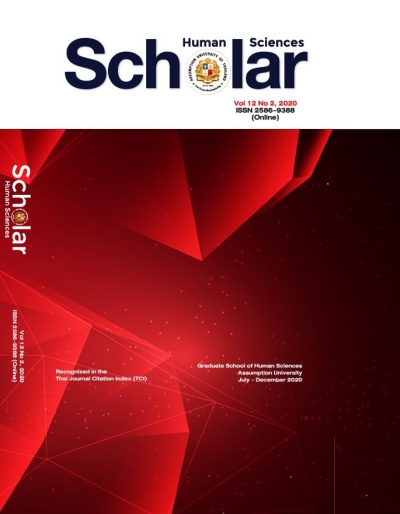A Correlational Study of Self-Efficacy and Perceived Parental Encouragement for Learning English as a Foreign Language with English Academic Achievement of Batch 5 and Batch 6 Students at Level Up Academy, Loikaw Township, Kayah State, Myanmar
Keywords:
Self-Efficacy, Perceived Parental Encouragement, English as a Foreign Language, English Academic Achievement, Listening Efficacy, Speaking Efficacy, Reading Efficacy, Writing Efficacy.Abstract
Abstract: The purpose of this quantitative study was to investigate if there was a significant relationship of self-efficacy and perceived parental encouragement for learning English as a foreign language with English academic achievement of Batch 5 and Batch 6 students at Level Up Academy, Loikaw Township, Kayah State, Myanmar. A population sample of 71 students from Batch 5 (34 students) and Batch 6 (37 students), enrolled during the academic year 2017-2018, was chosen for this study. A 32-item questionnaire was used to measure the levels of self-efficacy for learning EFL, including its four subscales (listening efficacy, speaking efficacy, reading efficacy and writing efficacy); an 8-item questionnaire was used to measure perceived parental encouragement for learning EFL; and the levels of English academic achievement were determined using the English subject’s final test. After data collection was done, descriptive statistics (means and standard deviations) and a statistical hypothesis testing (correlational analysis using Pearson’s product moment correlation and multiple correlation coefficient) were carried out to address the research objectives and hypotheses of this study. The research findings indicated that the levels of self-efficacy for learning EFL of both Batch 5 and Batch 6 students were slightly high. It was also found that the level of perceived parental encouragement of Batch 5 students was slightly high, while that of Batch 6 students was moderately high. The English subject’s final test revealed that Batch 5 and Batch 6 students had good English academic achievement. Correlational analysis using Pearson’s product moment correlation suggested that there was a strong, significant and positive relationship of self-efficacy for learning EFL with English academic achievement of Batch 5 and Batch 6 students. However, there was not significant relationship of perceived parental encouragement for learning EFL with English academic achievement of Batch 5 and Batch 6 students. The four subscales of self-efficacy for learning EFL (listening, speaking, reading and writing efficacy) were also strongly, positively and significantly correlated with English academic achievement of Batch 5 and Batch 6 student Level Up Academy, Loikaw Township, Kayah State, Myanmar.
References
Acikel, M. (2011). Language learning strategies and self-efficacy belief as predictors of English proficiency in a language preparatory school (Unpublished master’s thesis). Middle East Technical University, Ankara, Turkey.
Association of Southeast Asian Nations. (2012). ASEAN overview. Retrieved from http://www.asean.org/asean/about-asean/overview
Bandura, A. (1977). Self-efficacy: Toward a unifying theory of behavioral change. Psychological Review, 84(2), 191-215.
Bandura, A. (1994). Self-efficacy. In V. S. Ramachaudran (Ed.), Encyclopedia of human behavior (Vol. 4, pp. 71-81). New York: Academic Press.
Bandura, A. (1997). Self-efficacy: The exercise of control. New York: Freeman.
Bohdanska, B. (2012). The level of knowledge of the cultural background of English-speaking countries among students of English language at a second school (Unpublished master’s thesis). Palacký University Olomouc, Olomouc, Czech Republic.
Chen, H. (2007). The relationship between EFL learners' self-efficacy beliefs and English performance (Unpublished doctoral dissertation). Florida State University, Tallahassee, FL, USA.
Cheng, L. (2012). The power of English and the power of Asia: English as lingua franca and in bilingual and multilingual education. Journal of Multilingual and Multicultural Development, 33(4), 327-330.
Gardner, R. C. (1985). Social psychology and second language learning: The role of attitude and motivation. London: Edward Arnold.
Gardner, R. C. (2004). Attitude/motivation test battery: International AMTB research project. Canada: The University of Western Ontario.
Gardner, R. C. (2006). The socio-educational model of second language acquisition: A research paradigm. Amsterdam: John Benjamins.
Gardner, R. C. (2010). Motivation and second language acquisition: The socio-educational model. New York: Peter Lang Publishing.
Hou, J., & Lynch, R. (2016). A correlational study of motivation for learning Chinese according to academic achievement and parental encouragement among Grade four to Grade six students at Ladprao Bilingual School (LBS), Bangkok, Thailand. Scholar: Human Sciences, 8(2), 94-105.
Ireland, G. V., & Van Benthuysen, R. (2014). Contemporary issues in EFL education in Myanmar. Journal of Bunkyo Gakuin University, 14, 151-160.
Kirkpatrick, A. (2012). English as an international language in Asia: Implications for language education. Dordrecht: Springer.
Kitikanan. P. (2017). The relationship between English self-efficacy and English learning achievement of L2 Thai learners. Language Education and Acquisition Research Network (LEARN) Journal, 10(1), 148-163
Lawrence, A. S., & Barathi, C. (2016). Parental encouragement in relation to academic achievement of higher secondary school students. International Journal of Advance Research and Innovative Ideas in Education, 2(6), 1234-1239.
Marina, N. (2018). The relationship between motivation and perceived parental encouragement for learning English as a foreign language with English achievement of Grades 6 to 8 students at St. John’s Private School, Pathein, Myanmar (Unpublished master’s thesis). Assumption University, Bangkok, Thailand.
Phyu, E. S. (2017, Dec 15). Why can’t Myanmar kids learn English? Myanmar Times.
Wang, C., Kim, D.-H., Bong, M., & Ahn, H. S. (2013). Examining measurement properties of an English self-efficacy scale for English language learners in Korea. International Journal of Educational Research, 59, 24-34.
Zhang, J., & Lynch, R. (2016). The relationship between Primary 5 and 6 students’ perceptions of parental encouragement and their academic achievement in Mandarin learning at an international school, Bangkok. Scholar: Human Sciences, 9(2), 243-250.
Zhang, Z., Zhang, C., Zhang, X., Liu, X., Zhang, H., Wang, J., & Liu, L. (2010). Relationship between self-efficacy beliefs and achievement motivation in student nurses. Chinese Nursing Research, 2(2), 67-70.




